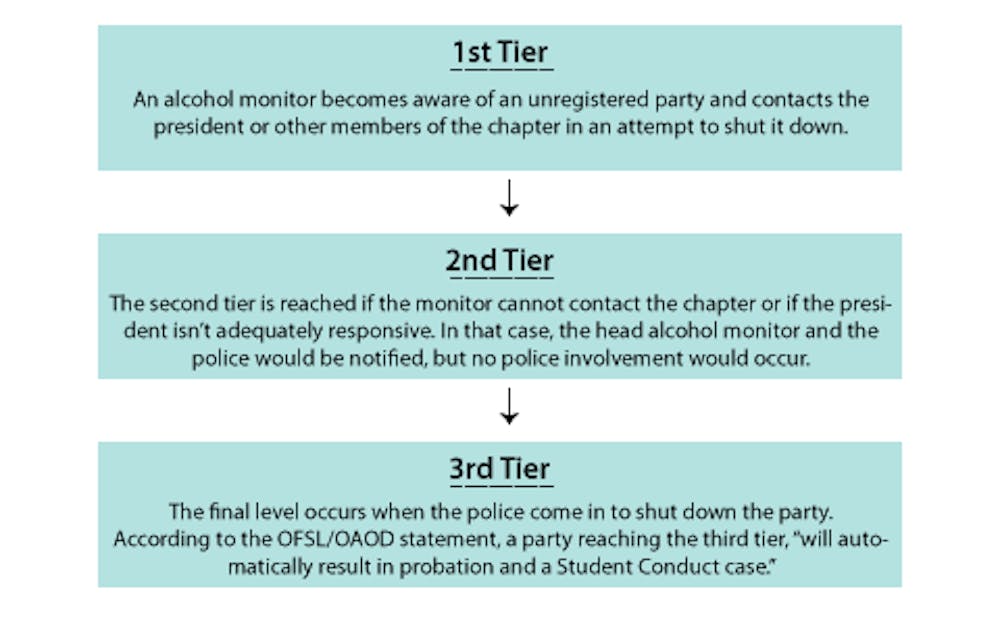
While hosting an unregistered party is still prohibited, the consequences for doing so have undergone some structural changes.
The Interfraternity Council, the Office of Fraternity and Sorority Life and the Office of Alcohol and Other Drug Program Initiatives recently collaborated to expand and reorganize the list of possible recommended sanctions for a number of infractions. The majority of these changes will apply to unregistered parties, said College junior and IFC president Andrew Turell.
According to an email statement from OFSL and OAD, no changes were made to the University’s policies on hosting unregistered parties. The changes regarded methods of determining the appropriate sanctions. “Starting [the weekend of Feb. 2], fraternities that host unregistered parties will be sanctioned according to a 3-tiered plan as a way to encourage both adherence to university policy as well as cooperation with late night staff.”
According to Turell, the first tier of sanctions is reached if an alcohol monitor — a late night staff member who works to enforce Penn’s alcohol policies on Thursday through Saturday nights — becomes aware of an unregistered party and contacts the president or other members of the chapter in an attempt to shut it down.
The second tier is reached if the monitor cannot contact the chapter or if the fraternity isn’t adequately responsive. In such a case, the head alcohol monitor and the police would be notified but no police involvement would occur. The final level occurs when the police come in to shut down the party.
According to the OFSL/OAD statement, a party reaching the third tier, “will automatically result in probation and an [Office of Student Conduct] case.”
“There are a variety of times where lines could blur but those are the general guidelines,” Turell said. Extenuating circumstances, like having unnecessary police intervention or mistaking a gathering of housemates for an unregistered party, would call for deviation from this tiered system, he said.
Turell added that the list of recommended sanctions are more like guidelines than hard and fast rules, since the Judicial Inquiry Board, the judiciary arm of the IFC, determines the most appropriate consequences for each case individually.
College junior and JIB manager Matthew Feldman said that the JIB takes into account things like the chapter’s size and financial status when determining the appropriate consequence for each offense. “Tailoring the sanctions to the house is something that’s very important to us,” he said.
Turell cited fines and community service as possible consequences for any unregistered party, but he said the exact punishment depends on the individual circumstance. For example, “for some houses, a financial punishment would be much more severe than some others in terms of their dues structure,” he said.
Feldman added that many of the sanctions are educational in nature, but the OAD is still finalizing the compiled list. Director of the OAD Julie Lyzinski Nettleton said in an email, “A list of sanctions cannot be made public because each case will be assessed based on the specifics of the case and, therefore, the most appropriate sanctions will be given based on this information.”
The revisions of the possible sanctions were part of a “standard review of process,” according to Turell. No specific event triggered the changes, but OFSL Director Scott Reikofski said that there have been one or two past instances of unregistered parties in which the chapters “weren’t as cooperative as they should’ve been.”
However, Turell doesn’t see this as a problematic trend on campus. “There are definitely no more unregistered parties now than there have been in the past year,” he said.
While Feldman doesn’t expect that these changes will significantly reduce the number of unregistered parties that are thrown, he hopes that the sanctions will help address any issues in the most constructive way possible. “It will help … these organizations grow stronger and make the Greek community a better place for everyone,” he said.
The Daily Pennsylvanian is an independent, student-run newspaper. Please consider making a donation to support the coverage that shapes the University. Your generosity ensures a future of strong journalism at Penn.
DonatePlease note All comments are eligible for publication in The Daily Pennsylvanian.







